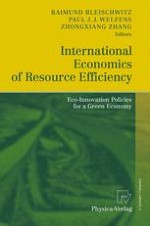
2011 | OriginalPaper | Buchkapitel
1. Sustainability Economics, Resource Efficiency, and the Green New Deal
verfasst von : Lucas Bretschger
Erschienen in: International Economics of Resource Efficiency
Verlag: Physica-Verlag HD
Aktivieren Sie unsere intelligente Suche, um passende Fachinhalte oder Patente zu finden.
Wählen Sie Textabschnitte aus um mit Künstlicher Intelligenz passenden Patente zu finden. powered by
Markieren Sie Textabschnitte, um KI-gestützt weitere passende Inhalte zu finden. powered by